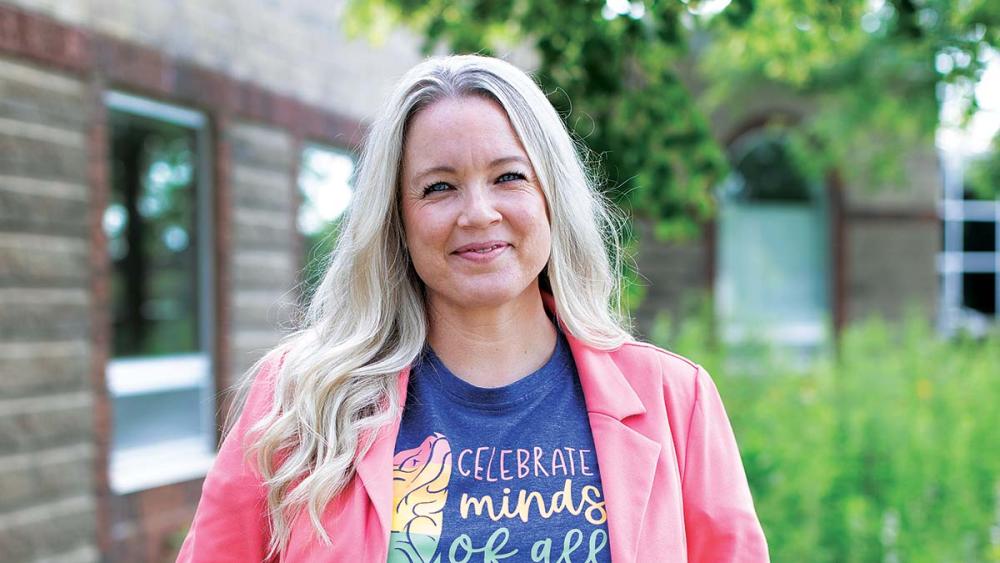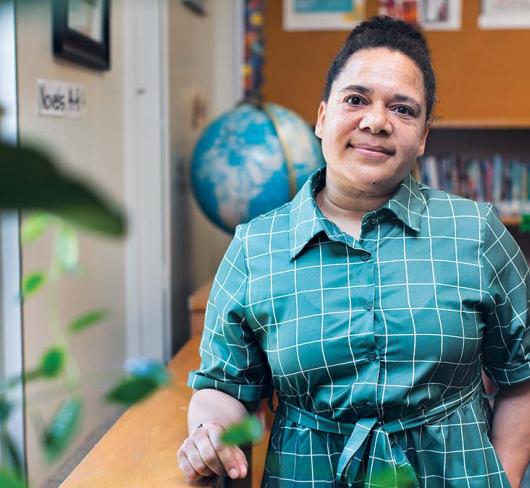
Special Education: Rewriting the Story
For the past 20 years, I have been a teacher. I have been a classroom teacher for grades 1 to 4. I have taught with an exceptional team of educational assistants in an alternative continuum of education class, supporting students with developmental disabilities. I have also served as a developmental support teacher, assisting students with autism and the educators who supported them in over 30 schools in Waterloo Region. More recently, I held the role of special education consultant with a specific focus on social-emotional learning. Currently, I serve as a special education resource teacher at a K-8 school.
Not only do I want you, the reader, to know who I am, I also want you to understand why I am who I am. I write from the perspective of having grown up with the privilege of witnessing inclusivity in its truest form. My Aunt Connie acquired a disability early in life, and my grandparents and mom exemplified inclusion throughout her life. It was modelled to me to strive to learn as much about myself and others as possible. Inclusion was not an afterthought; it was a given. I know how to reflect on my own need for strategies and accommodations, and I am interested in what others need to be included and have access to what matters to them.
Two essential elements of inclusion are curiosity and reflection. There isn’t a “finish line.” On the contrary, there is always room for learning more, as we consider individual strengths, needs, experiences, supports, access and reflect on our own biases. Since I am aware of what inclusivity is, I am acutely aware of what it is not. You will hear folks say, “Inclusion without support is abandonment,” and that is precisely what is happening in classrooms across Ontario.
The Story of "Kids These Days"
Educators enter this profession because students and their learning are of utmost importance. Unfortunately, current educational systems are increasingly failing to provide the necessary resources to achieve positive outcomes.
As I write this, there are 350,000 children identified with special education needs in Ontario who aren’t getting the support and resources they need. There are undoubtedly more students who have not yet been identified. When students’ special education needs aren’t met, everyone loses.
Education stakeholders have access to the science of learning, allowing us to draw on research and knowledge about neuroscience and the conditions that best support learners. Yet, that knowledge gets tossed aside by a system suffering from massive funding cuts, one that is reliant on unrealistic expectations of teachers and low expectations for children’s achievement and abilities.
Since returning from the pandemic, I have observed an astounding increase in the number of students who are not receiving the attention and support they deserve. One of the significant consequences of students not receiving proactive support is that we often end up in situations requiring reactive support and de-escalation,
Some students with unmet learning needs can easily disrupt the learning of others and/ or can be violent and aggressive. This can result in a classroom evacuation, a student causing harm to others and/or themselves and potentially necessitate physical intervention. Every student loses out because, in many situations, the best we can do is react. In some cases, we aren’t able to teach skills and strategies because our focus must be on mitigating risks.
Students are demonstrating their need for connection and learning every day, and educators hear them loud and clear. The system, however, isn’t listening, as it fails to provide the range of placements and supports that honour a child as a whole person.
We are all aware of the saying “Kids these days ...” which is typically followed by a negative comment about today’s youth. I would like to shift this narrative.
So, Here is the Real Story:
- Kids these days are trying desperately to keep up with the onslaught of things that are negatively impacting their well-being and mental health.
- Kids these days are experiencing high levels of stress and witnessing violence in schools.
- Kids these days are creating untrue stories about themselves because they are in a system that does not honour their strengths and support their needs. They are too young in their development to recognize that it is the system’s fault, not their fault.
- Kids these days deserve timely assessments, especially when their families cannot afford to pay to get one done privately.
- Kids these days are demonstrating kindness, empathy and compassion based on how others model it.
- Kids these days are some of our best role models of true inclusivity.
- Kids these days are missing out on learning because of the adults currently in power.
- Kids these days have unmet needs in the education system, and if the systems meant to protect and educate them don’t improve, they will grow up to be adults with unmet needs.
A New Narrative for my Colleagues
This past March, I had the opportunity to read ETFO’s new policy paper, Promises Unfulfilled: Addressing the Special Education Crisis in Ontario. Page after page, I experienced an overwhelming sense of validation. It took my feelings and experiences and put them into facts and data. That validation was closely followed by anger and hurt.
You see, I have spent years watching my colleagues be professionally gaslit by vague government responses to our cries of crisis. They are feeding us breadcrumbs and telling us it is dinner. I listen to individuals who repackage past theories as a shiny new way to suggest, “If you just did XYZ, then every student in your class would be doing great,” without ever successfully implementing anything themselves or considering the conditions needed for learning. I recently watched a webinar where the presenter stated, “All learners can access grade-level curriculum,” which is entirely dismissive of students who have a learning profile that cannot keep pace with curricular expectations but are just as worthy of a quality public education.
I have witnessed the normalization of teacher burnout, only to have it weaponized against us by suggesting that teachers are not working hard enough for students and are taking too many days off. The reality is that the system has created the perfect storm for burnout.
Teachers are eager to learn more and implement best practices for all their students, but they lack the necessary conditions, professional development, time, resources and support to do so. Students are, by far, the best part of my job and I am deeply committed to them, but underfunding is affecting schools across Ontario. My school lost over a million dollars in funding since the Ford Conservative government came to power in 2018. That is more than $1,500 per student. My colleagues and I cannot make up for that loss.
After the press conference in March to release Promises Unfulfilled, the Ministry of Education responded disdainfully, using a blanket statement that it has “never spent more on education,” without acknowledging inflation, students’ complex needs, an outdated framework, the increase in our provincial population, the rise in poverty and greater income inequality. As kids these days say, “The math isn’t mathing.”
I rarely get the opportunity to watch my colleagues being told the truth about why they feel stretched thin and why students are struggling. Reading Promises Unfulfilled validated what my colleagues and I see every day. I encourage all stakeholders (educators, parents, caregivers, community agencies, students, the government, etc.) to read this report, which contains 27 clear and thoughtful recommendations.
A Few Takeaways From the Report That I Found Particularly Validating Include:
The Need to Index Special Education Funding to Inflation
The data from the 2025-26 school year used by the ministry is insufficient, as 80 per cent of the census data for the Differentiated Need Allocation model is two years older than our current Grade 12 graduating class. Limited demographic information from the Ontario School Information System (OnSIS) is a barrier to the proper allocation of funds. The data being used does not account for students’ individual needs, identities and social locations. This funding shortfall is evident in classrooms across Ontario, underscoring the need for more profound systemic changes to the funding model.
Members Continue to Report an Increase in Violence
It’s important to note that this issue is not the fault of the children. These behaviours indicate that children are under a lot of stress and lack the support to develop the skills they need to manage that stress. Teachers work hard to build relationships, but relationships alone do not stop stress responses in another person. Every class has students who face barriers to their learning, even if these barriers are not formally recognized.
The report notes that a lack of early interventions and a backlog of needed assessments are significant and ongoing reasons why students struggle. Assessments help us understand how students learn, so we can teach in ways that honour their relative areas of strength and need. A lack of proper assessments creates ongoing barriers and inequalities for students. Early intervention helps us teach the skills needed for positive outcomes.
Implementing the Inclusive Model of Education
The report focuses on the fact that the theory of the inclusive model is impossible to implement within the current educational system. Inclusivity is not a checkbox; it is an experience with proactive and responsive relational connections based on individual needs and demographics. It is based within the collective community and specific to the individual. People are being told the story that the model across Ontario is inclusive, but it is a myth that needs to be dispelled because it is not the truth. On the contrary, students are in classes that lack the instructional, environmental, or social-emotional accommodations they need to be successful. The number of teachers with specialized training and expertise is dwindling, while the number of colleagues requesting specialized support is increasing.
Smaller Classes Are Key
Smaller class sizes and adequate staffing levels are essential to implementing more effective instruction, including Universal Design for Learning. Considering class size, alongside class composition and student needs, is paramount. Class sizes are far too large to make learning accessible for everyone. I recently spoke with Kindergarten teachers who told me that they have no time to spend one-on-one with most of their students and that alerts are going off on their watches because the decibel reading has detected harmful levels of environmental noise in their classrooms.
Helping Rewrite the Story with Parents and Caregivers
For parents and caregivers, it must be a significant weight at times to not only be raising an exceptional child (or perhaps more than one), but to constantly have to advocate for them. For many, this begins the moment their child is born.
As educators, we are honoured to teach these exceptional children and learn more about them as they grow and learn. We so appreciate the efforts parents make to share their stories and experiences. Parents and guardians are formidable advocates who call policymakers to action.
The Education Act states that the minister of education must “ensure that appropriate special education programs and services are provided for exceptional pupils in accordance with the act and regulations,” and that it is “mandatory for all school boards to provide, or purchase from another board, special education programs and services for their exceptional children.”
The current provincial funding shortfall, however, forces boards to ration resources, rather than meeting student needs through sufficient and appropriate staffing, placements, supports, services and resources. To assert that a fully inclusive model is best and then fail to provide the necessary supports in schools is ableism cloaked as kindness.
Educators will continue to work hard to provide the best learning experiences we can, but what we see in our schools is the reality: special education funding is failing our students.
The Next Chapter in Special Education
It is never too late to learn about inclusive educational practices and conditions. Just because I learned at a young age doesn’t mean it’s too late for our policymakers to understand these concepts as adults. The second recommendation in Promises Unfulfilled is to convene a special education committee that includes education stakeholders (including affiliates). I would wholeheartedly dedicate time to building shared vision, values and actions on a committee like that, and so would many others.
The government is the gatekeeper of major funding decisions – it decides who to include and how to include. This has a direct correlation to how students are taught, what is valued and who is valued.
I hope that our work as ETFO members, including the recent release of Promises Unfulfilled, helps us all continue pushing for the support and resources children in Ontario public schools – and their families – deserve.
Each of us has our own story about why we chose to become teachers, but one thing we all share is a commitment to students and the positive outcomes they deserve in public schools across Ontario.
May we continue to share our stories so that hopefully, in time, they can be rewritten. So that it becomes the norm that students have the strategies and resources they need, can be seen for who they are, can have a voice and agency in how they learn, and have accessible spaces to make learning and positive outcomes possible. Everyone deserves a public education system that provides them with the true story of who they are: worthy and valued learners.
Jennifer Pinder is a member of the Waterloo Teacher Local.

